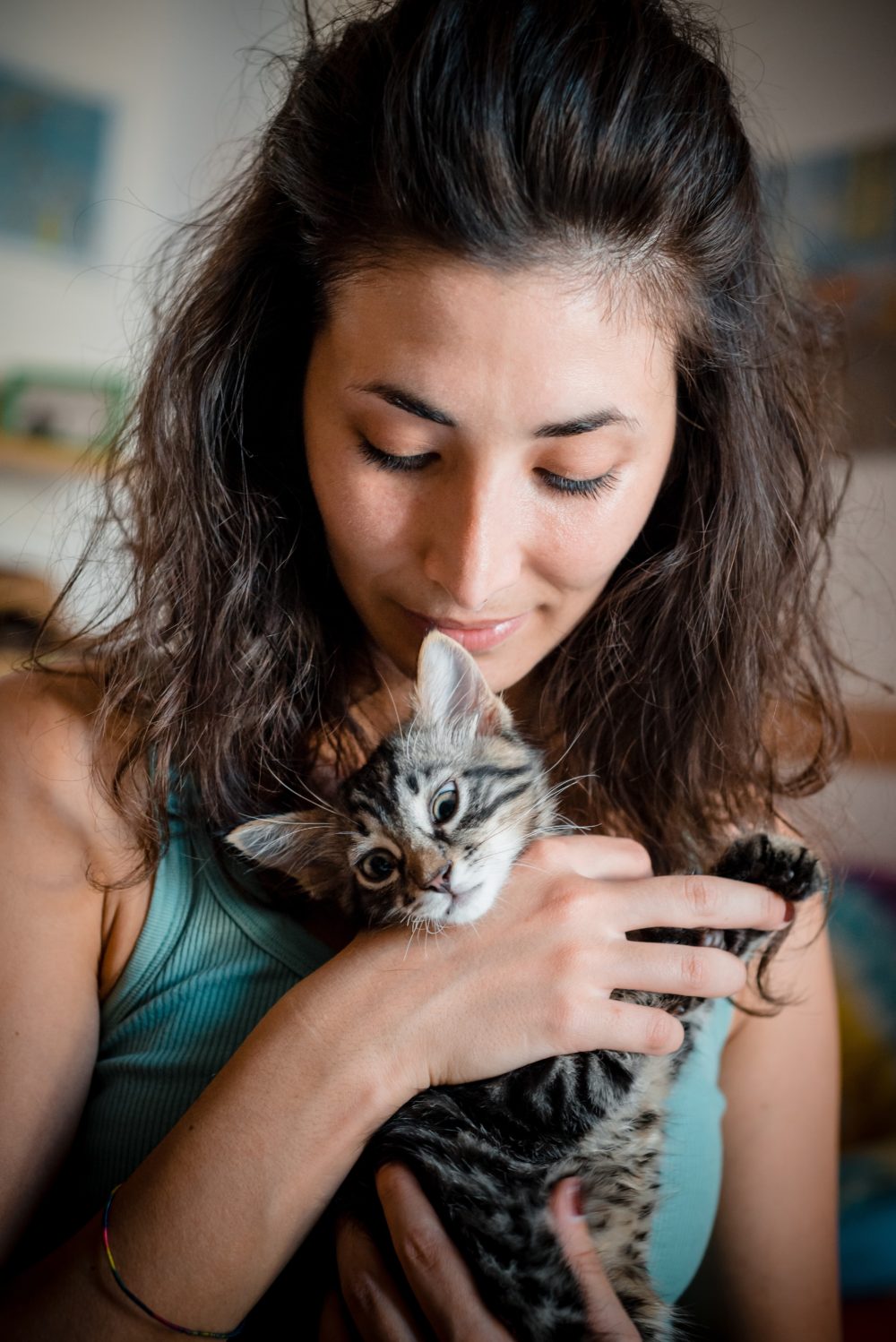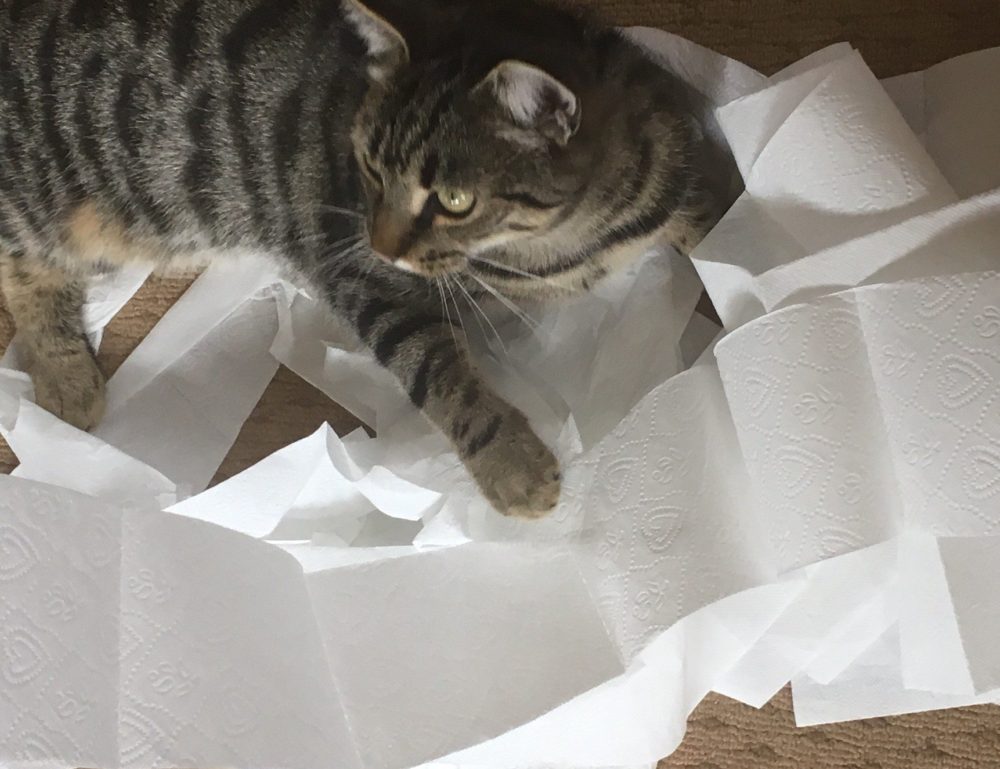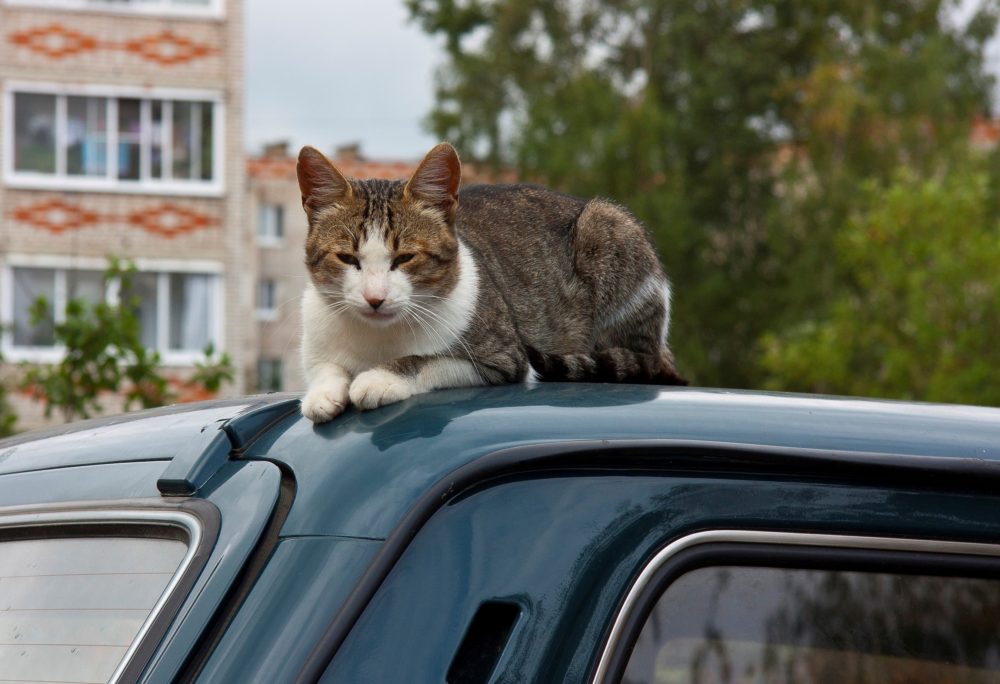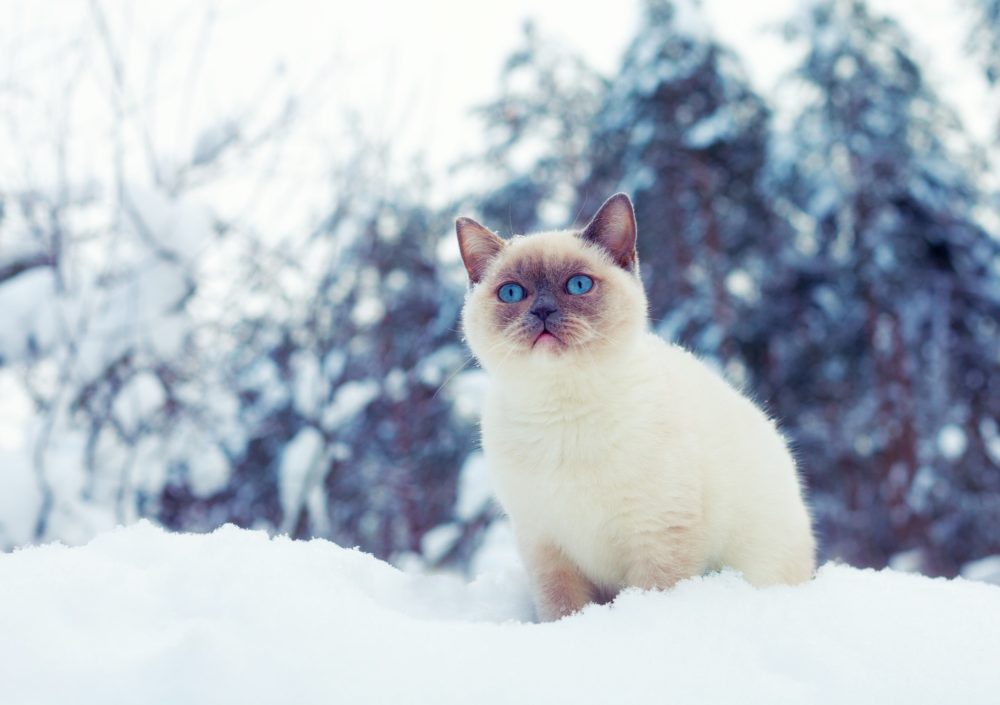
Do cats like snow?
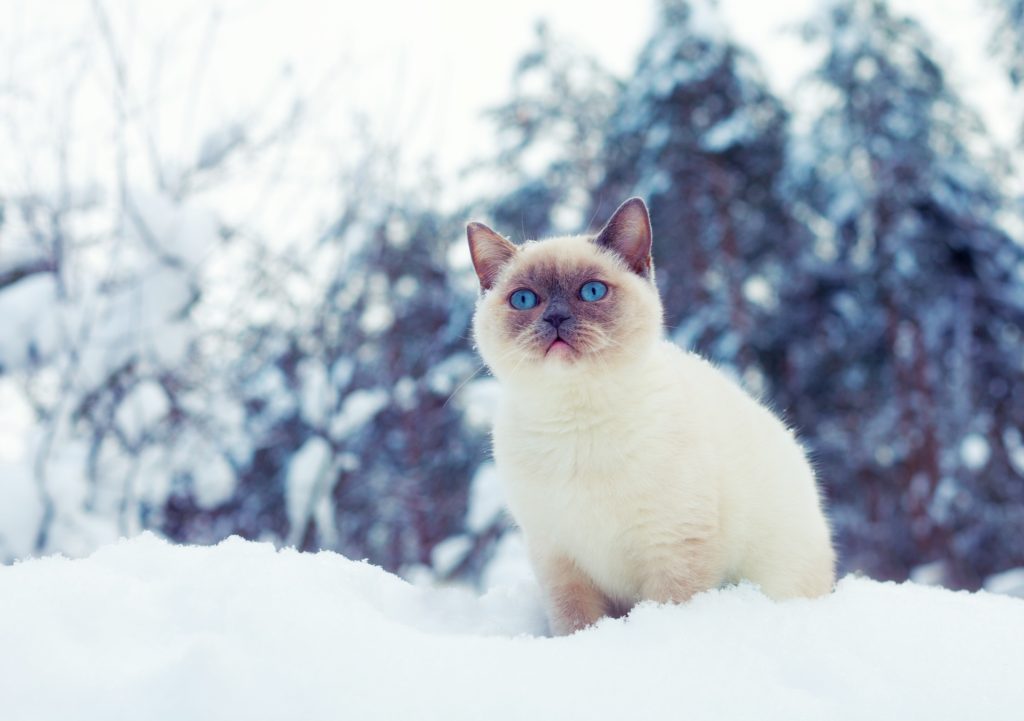 There’s nothing like opening the curtains on a cold winter morning and discovering that a blanket of snow has fallen over night. A pretty picturesque scene, just like a Christmas card. But the snow gets a mixed response from us humans. Kids usually scream in delight at the prospect of a day off school and rush to get out there sledging and building snowmen. Whilst us adults usually worry about travelling to work and is there enough food stockpiled in the house! But what do our feline friends make of this flaky, white, cold substance? Do cats like snow?
There’s nothing like opening the curtains on a cold winter morning and discovering that a blanket of snow has fallen over night. A pretty picturesque scene, just like a Christmas card. But the snow gets a mixed response from us humans. Kids usually scream in delight at the prospect of a day off school and rush to get out there sledging and building snowmen. Whilst us adults usually worry about travelling to work and is there enough food stockpiled in the house! But what do our feline friends make of this flaky, white, cold substance? Do cats like snow?
The first experience of snow, the delicate snowflakes floating down from the sky, a new blanket of white over the landscape can spark an excitement of intrigue in most cats. Cats love to explore and investigate new sights, sounds and smells and snow is no exception. In our article ‘Do cats like rain’, we saw that the general consensus amongst cat owners seemed to be that most cats don’t like rain as generally, cats simply don’t like water and getting wet. And until the snow starts melting it will not feel wet. The warm fur of a cat will keep them warm and the top layer of fur is water resistant. If they get soaking wet and all the fur is drenched, then they can feel become very uncomfortable. Being soaked through will cause a loss of body heat and exposure to being cold and wet for a long period of time could potentially result in hypothermia.
Do cats like snow?
Therefore, it is quite subjective as to whether or not cats will like snow. Some will enjoy playing in the new sensations whilst other cats will simply not enjoy the cold or the wet feeling that follows. Let your kitty explore the snow safely and let them guide you as to their preference. Some will be sensible and head straight back indoors to the warmth whilst others, as many cat owners have shared, will delight in playing and jumping in the snow drifts.
Snow supervision with your cat
At times of heavy blizzards and deep snowfall it is best to keep your cat safe indoors. However, with just a little dusting on the ground, the icy cold flakes may be an interesting adventure. If it’s the first time your cat has experienced snow, stay with her and supervise her while she settles and susses out this new sensation. The feeling of icy paws and the freezing temperatures may simply not be for her and she may well run back to the warmth and safety of the indoors.
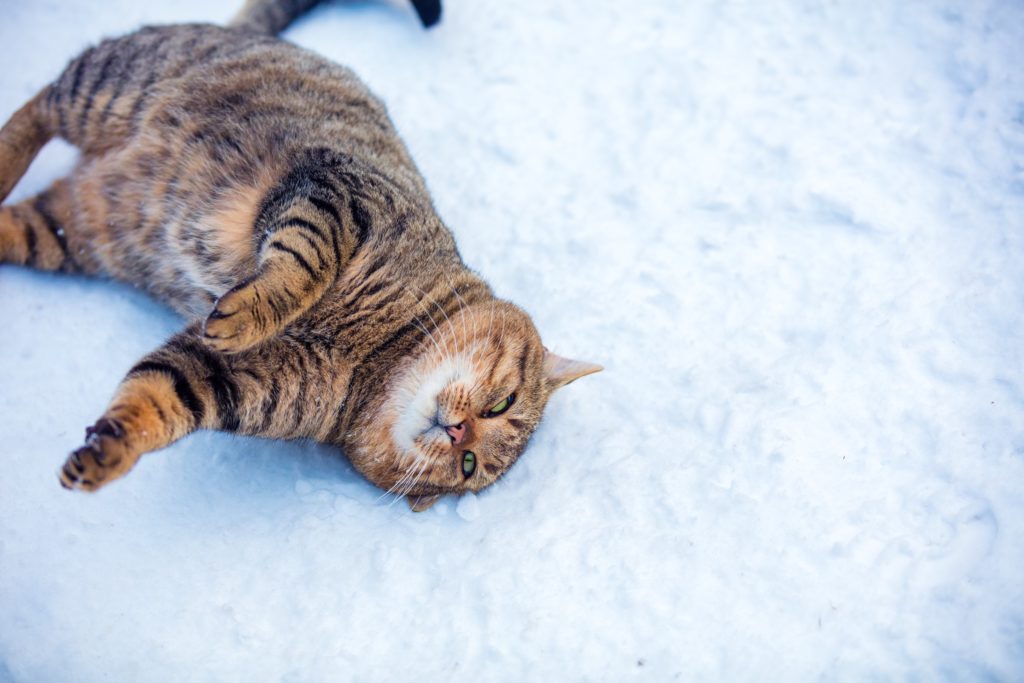
How to keep your cat safe in the snow
If your cat does have outside access during times of snow, then there are a few measures that cat owners need to take to ensure their safety.
Ensure your cats has access to somewhere warm outside
If your cat enjoys an outside stroll in the winter it is important to ensure they always have access to shelter, somewhere warm and dry like an outhouse or garage. It also applies to cats who have access to a catio or an enclosed garden.
You can buy or make shelters for your outdoor cats. Making your own shelter doesn’t have to be complicated or expensive. A waterproof wooden box with a small opening, or a dedicated cosy place in an outbuilding or garage is perfect. Add some straw or a blanket for warmth and comfort. After fresh snowfall ensure the walkway to the shelter is cleared.
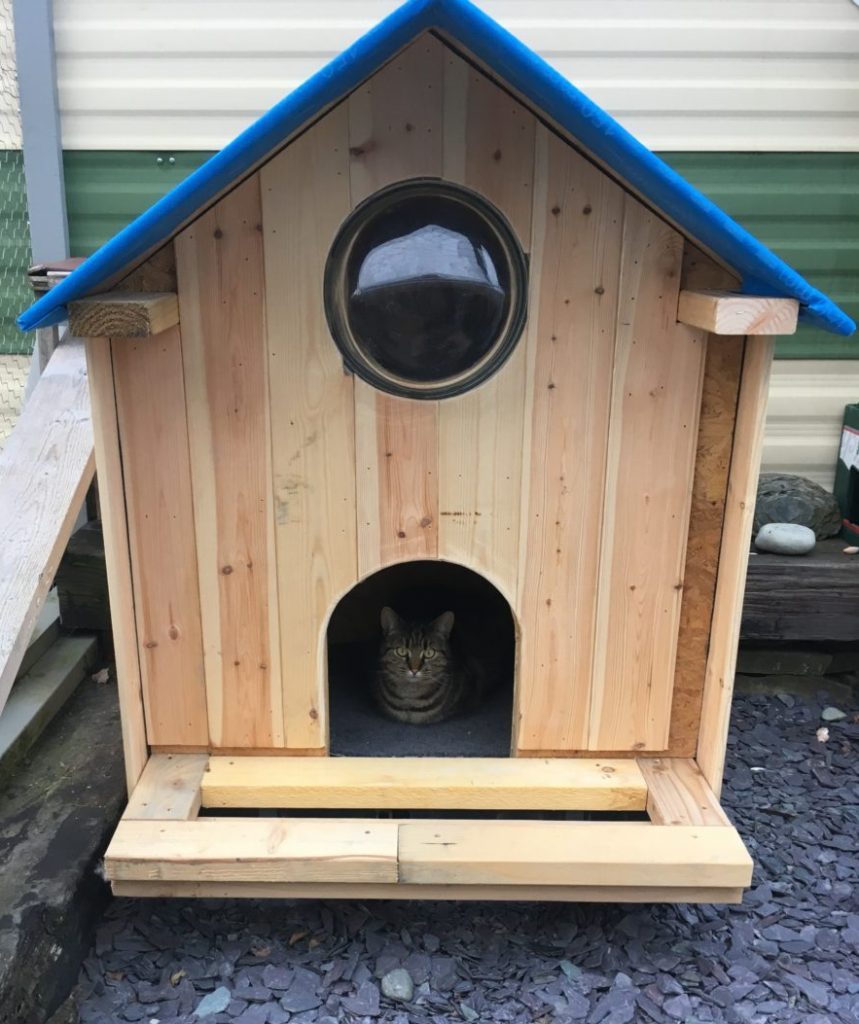
Keeping your cat indoors
On extremely cold temperatures it is advisable to keep cats indoors as hypothermia and frostbites are key risk factors. The fur coat of cats will not protect them from severe freezing temperatures. On cold rainy days, or in snow, the fur will get wet and this then decreases their body temperature. Why not use the time to playing together to help burn off the excess pent up energy?
Check cat flap
Cat flaps can become frozen or hidden beneath heavy snowfall. Check the cat flaps often to ensure your cat can get out, and more importantly, return indoors safely.
Check car
Cold frosty days can make warm car engines a fabulous place to snuggle if you are a cat. Before setting off on your journey always check underneath your car and under the bonnet. Simply slap the bonnet a couple of times before starting the engine or beep the horn.
Check paws
Snow, grit and salt can aggravate little paws therefore check your cat’s paws when she returns and gently wipe away any residue. This is also important for cats who have access to a catio or an enclosed garden as compacted snow on their paws can lead to a frostbite.
Litter tray
Snow on the ground will mean that a cat who usually toilets outdoors will need access to a litter tray.
Keep your cat indoors at night
Some cats have 24-hour free access to come and go as they please. It may be advisable, when deep snow and low temperatures are forecast, to keep your cat indoor overnight. Check out our article ‘Should I let my cat outside at night’ for helpful tips on implementing this.
Fresh water
Snow comes hand in hand with freezing temperatures which mean outside water sources can become frozen. Minimise the risk of frozen drinking water by using deep bowls and placing in sunny locations if possible. There are heated bowls available or put a microwavable heating pad underneath the water bowls to prevent freezing. Building a feeding station for outside will also help protect the food and water from freezing.
Antifreeze poisoning risks
Antifreeze, also known as ‘ethylene glycol’ is extremely toxic to cats. It has a tempting, sweet smell that some cats seem attracted to, but if cats ingest even a little amount it can kill them. Ensure any spills are cleaned up. If a cat walks through the spillage they are likely to lick their feet and fur clean. If you think your cat may have ingested antifreeze, contact your veterinary immediately.
What temperature is too cold for a cat?
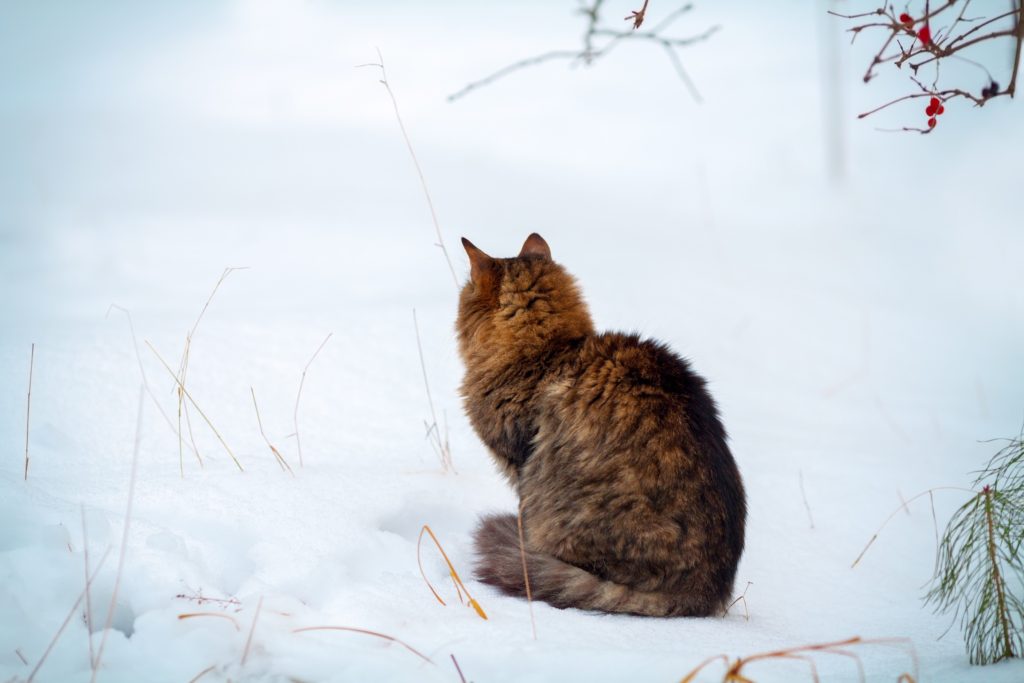 Cats that are used to venturing outside all year round are certainly going to be more acclimated to the various extremities of the weather and seasonal variations in temperature than a cat who spends most of its life indoors. Older cats and those with shorter hair will be more at risk than a young, healthy, long haired cat. However, the general advice from vets is that it is advisable not to allow your cat to stay outdoors when the average daily temperature is lower than 44°F without access to a warm retreat.
Cats that are used to venturing outside all year round are certainly going to be more acclimated to the various extremities of the weather and seasonal variations in temperature than a cat who spends most of its life indoors. Older cats and those with shorter hair will be more at risk than a young, healthy, long haired cat. However, the general advice from vets is that it is advisable not to allow your cat to stay outdoors when the average daily temperature is lower than 44°F without access to a warm retreat.
The normal body temperature for a cat is between 100.5° and 102.5°. Hypothermia in cats is defined as body temperature falling below 100°F. It is caused by long exposure to cold temperatures and especially if the fur has become wet. As the cat’s body temperature falls, heart rate and bodily activities will decrease and can lead to death unless treatment is sought.
Symptoms of hyperthermia include:
- Cat shivering violently as they attempt to generate warmth.
- Skin is cold to the touch
- Difficulty breathing
- Lethargic
- Loss of consciousness
The symptoms will become more noticeable as the hypothermia becomes more severe. Veterinary advice should be sought as soon as hyperthermia symptoms are noticed. Whilst awaiting veterinary care there are steps you can take to stabilise the condition:
- If your cat is wet, dry her up and wrap in a warm towel or blanket. Move to a warm environment.
- Hot water bottles can help to warm your cat but ensure they are not too hot.
Do cats eat snow?
Unlike many other animals, eating snow will not be sufficient to keep a cat hydrated. It will also lower the internal body temperature of the cat. Cats are more likely to seek other water sources such as puddles or mini pools of water. It is important to ensure that there is access to outside clean, safe water for your cat – and indeed for any stray/feral cats. Freezing water is an issue in the winter but there are a few options to ensure outside cats have access to unfrozen water in winter:
- Use thick, deep, plastic containers
- Check water bowls regularly
- Place water in a sheltered feeding station
- Place heated pads under the water bowls or use heated water bowls.
For a detailed guide on keeping both outdoor, and indoor cats, safe in winter, check out our article ‘Keeping cats safe in winter – A complete guide’.
Other articles you may find of interest:
Can cats sense a storm? And how to keep cats calm if they are anxious
Do cats like rain? Where do cats go when it’s raining?
How to celebrate Christmas with your cat
Should I leave the heating on for my cat? Do cat’s fur keep them warm?
